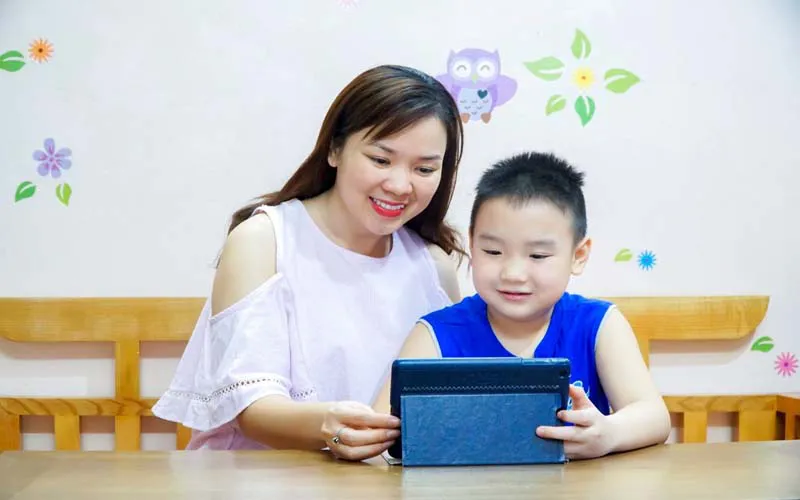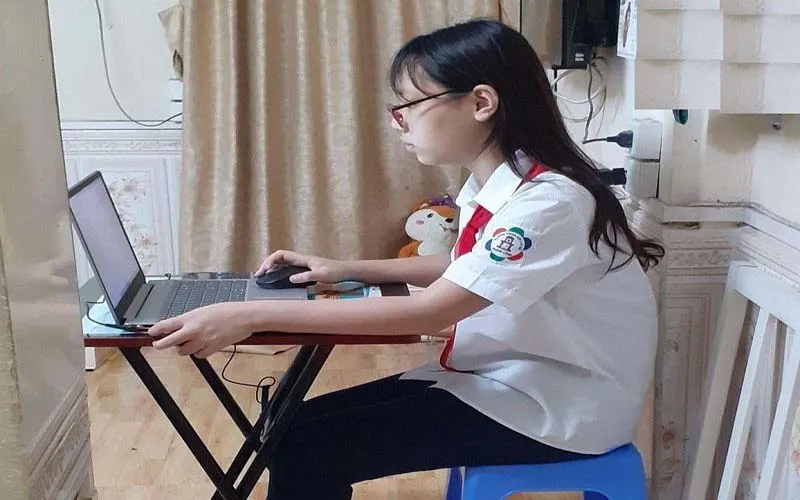Vietnamese children in need of online safety skills: experts
It's necessary to have joint efforts from all stakeholders, regardless of the Government, families, civil society, experts, and children, to ensure a safe digital environment for youngsters.
Children aged 12-17 should be equipped with the essential knowledge to protect them in the digital world, as only 36% of them are taught how to stay safe online in Vietnam.
Tran Dang Khoa, Deputy Director of the Information Security Department under the Ministry of Information and Communications (MIC), raised the idea for fear that Vietnamese children will face increasing online threats if adults do not pay enough attention to the children.
Khoa cited a report by the Ministry of Public Security's Department of Cyber Security and High-Tech Crime Prevention, which said that of 135 cases of online child abuse handled by police in the first quarter of 2023, 116 were related to sexual harassment.
In the first three months of the year, the department blocked around 10,000 websites with harmful content, the official added, stressing that recent statistics show that sexual harassment has always been the biggest online threat to children.
The internet poses many potential risks to children, so parents must teach them to stay safe online. Photo: saozone.net |
"The second biggest risk of online child abuse is bullying, while the third is enticing children to commit crimes, and the fourth is spreading harmful content to minors," Dang said.
The deputy director stressed the problems because many Vietnamese children are allowed to use the Internet at an early age.
Citing a Google survey conducted last year, Khoa said the average Vietnamese child starts using a smartphone at nine, four to six years earlier than the global average.
According to Lesley Miller, deputy representative of the United Nations Children's Fund (UNICEF) in Vietnam, a report released by her organization in August last year found that of 994 children surveyed (aged 12-17), 23% said they had accidentally seen sexual content in the form of online videos or photos.
She urged the Vietnamese Government to allow private companies to work with authorities to screen and block online content related to child abuse.
The survey also found that most children who had been sexually harassed online did not tell their parents or guardians because they did not think it would be of any help and were worried about the consequences, Lesley Miller said.
Deputy Minister of MoLISA Nguyen Thi Ha said the Vietnamese government had made great efforts to better protect children on the internet by introducing various legal documents such as the Law on Children, the Law on Cybersecurity and the Law on Access to Information.
Tran Quynh Anh, a Thanh Cong Secondary School student in Hanoi's Ba Dinh District, studies online at home. Photo: Nam Du/The Hanoi Times |
Ha said the Prime Minister had approved a national action program on child protection for 2021-2030 and a program on protecting and supporting children's healthy and creative interaction on the Internet for 2021-2025.
She added that Vietnam and ASEAN member countries adopted the Declaration on the Protection of Children from all Forms of Online Exploitation and Abuse in ASEAN in 2019 and the Declaration on the Elimination of Bullying of Children in ASEAN in 2021.
"While the development of IT and the Internet provides children with many opportunities for learning and entertainment, it also exposes them to many potential risks in the online space that could harm them in the long run," Ha said.
In the first five months of 2023, the National Child Protection Hotline 111 received 128 calls on child protection online, 30 of which denounced sexual harassment against children. The hotline also received three reports on video channels with content harmful to children. It's reported that 124 out of 128 calls to the hotline sought counseling services, while the remaining four cases asked for intervention for victims of child abuse in cyberspace. Notably, 30 of the 124 cases were related to child sexual abuse on the Internet.
Ha underlined the efforts to protect children in the online space and how to address the risks children face and promote healthy development opportunities for them in the digital world.
She also pointed to the joint efforts of all stakeholders, from Government, civil society, children's experts, parents, and children themselves, to the media, to create an increasingly safe and healthy digital environment for children.













